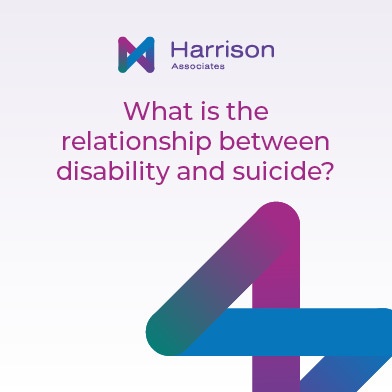People living with disabilities often face a range of social and economic adversities, with medical evidence suggesting that these disadvantages result in poorer mental health and wellbeing.
Research also suggests that people with disabilities are more likely to experience thoughts about suicide, and ultimately go through with the act, compared to people living without life-long disabilities.
And yet, whilst there has been a reduction in the number of people committing suicide over the past 10 years, the numbers are still alarmingly high, something that the upcoming World Suicide Prevention Day aims to raise awareness for.
What is World Suicide Prevention Day?
Launched in 2003, World Suicide Prevention Day is a global, annual campaign to help create a world where fewer people die by their own hands, ran by the International Association for Suicide Prevention (IASP).
Each year on September 10th, charities, organisations and communities across the world join together to raise awareness around suicide prevention, and it gives campaigners such as Samaritans, ReThink, Mental Health UK and even the World Health Organisation (WHO) an opportunity to support those suffering with suicidal thoughts, and those who have lost loved ones to suicide too.
Are there certain types of disability that result in higher suicide rates?
According to research published in the National Library of Medicine, suicide rates are significantly higher amongst people with major disabling conditions such as intellectual disability, spinal cord injury, and multiple sclerosis.
The findings then break this down further to show that when compared to the general population, the highest rates of suicide are amongst people with multiple sclerosis, followed by those with spinal cord injury and then by people with intellectual disability.
Studies also show that gender can have an impact, with the Journal of Public Health highlighting that men living with disabilities are also more likely than women to suffer from thoughts of suicide, and ultimately, more likely to act upon it.
Is the cost-of-living crisis having a worse impact on suicide rates?
Channel 4 recently aired a Dispatches documentary on the Truth About Disability Benefits; a powerful and moving episode which explored the failings of the Department for Work and Pensions (DWP’s) disability benefit system and the multiple harms caused to disabled people in the UK.
The documentary explains how the DWP’s systems have led to increased poverty, malnutrition, unnecessary deaths, and suicides. What’s more, the Citizen Network Research helped to facilitate a survey questionnaire in support of the programme, which after being completed by 3,500 people, concluded the following:
- 13% said they had attempted suicide as a result of interacting with the DWP.
- 32% said the DWP system had caused them to plan suicide.
- 61% said the way the system worked had caused them to have suicidal thoughts.
- 93% said the process of claiming benefits had made their mental health worse.
- 96% found the preparation for their assessment distressing.
- 89% said the system had aggravated their pre-existing conditions.
- 79% said the system had made their physical health worse.
- 61% said the system had caused them new health problems.
- 89% of respondents said the DWP is not “an ally to disabled people.”
The research also suggests that disabled people on benefits experience significantly worse health than the general population. In fact, changes in benefits which have reduced household finances, affecting people buying food, fuel and clothes, combined with the current cost-of-living crisis and energy bills skyrocketing, means that disabled people relying on benefits are struggling to live day-to-day.
This is leaving people emotionally drained and feeling increasingly insecure, with the added financial stresses leading to fear, anxiety and poorly affecting physical and mental health.
What can be done to prevent people with disability contemplating or committing suicide?
The National Library of Medicine research concludes that as suicide amongst people with disabilities is a complex and pressing public health concern, high priority prevention research must include valid estimates by age cohort, thorough assessments of the predictive importance of suicide risk factors, and determination of best practices in preventing suicide.
In response, the UK Government also recently announced a £5 million fund will be made available to support the voluntary, community and social enterprise (VCSE) sector on suicide prevention services; a grant which will focus on high-risk groups including those with pre-existing mental and physical health conditions.
We understand, and we are here to help
The aim of this grant, along with the monumental support behind World Suicide Prevention Day, is to reduce this preventable cause of death and help those with disabilities lead happier, healthier, and longer lives.
Here at Harrison Associates, we’re in support too.
Our goal is to lead the way for Case Management by offering an empathetic, outcome-focused approach which supports claimants every step of the way.
In fact, for over 30 years, we have developed, delivered and monitored tailor-made rehabilitation plans for those with catastrophic trauma, multiple injuries and disabilities.
Our team are trusted by over 500 legal firms, trusted by the solicitors and insurers dealing with complex cases, and most importantly of all, we are trusted by the people whose rehabilitation we manage.
To find out more about our services, contact our team today.




